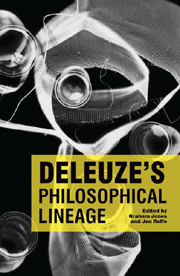Book contents
- Frontmatter
- Contents
- Acknowledgements
- List of Abbreviations
- Introduction: Into the Labyrinth
- 1 Plato
- 2 John Duns Scotus
- 3 G. W. F. Leibniz
- 4 David Hume
- 5 Immanuel Kant
- 6 Solomon Maimon
- 7 G. W. F. Hegel
- 8 Karl Marx
- 9 Hoëne Wronski and Francis Warrain
- 10 Bernhard Riemann
- 11 Gabriel Tarde
- 12 Sigmund Freud
- 13 Henri Bergson
- 14 Edmund Husserl
- 15 A. N. Whitehead
- 16 Raymond Ruyer
- 17 Martin Heidegger
- 18 Pierre Klossowski
- 19 Albert Lautman
- 20 Gilbert Simondon
- Bibliography
- Notes on Contributors
- Index
3 - G. W. F. Leibniz
Published online by Cambridge University Press: 12 September 2012
- Frontmatter
- Contents
- Acknowledgements
- List of Abbreviations
- Introduction: Into the Labyrinth
- 1 Plato
- 2 John Duns Scotus
- 3 G. W. F. Leibniz
- 4 David Hume
- 5 Immanuel Kant
- 6 Solomon Maimon
- 7 G. W. F. Hegel
- 8 Karl Marx
- 9 Hoëne Wronski and Francis Warrain
- 10 Bernhard Riemann
- 11 Gabriel Tarde
- 12 Sigmund Freud
- 13 Henri Bergson
- 14 Edmund Husserl
- 15 A. N. Whitehead
- 16 Raymond Ruyer
- 17 Martin Heidegger
- 18 Pierre Klossowski
- 19 Albert Lautman
- 20 Gilbert Simondon
- Bibliography
- Notes on Contributors
- Index
Summary
Gilles Deleuze once characterised himself as a ‘classical’ philosopher, a statement that was no doubt meant to refer to his indebtedness to (and affinities with) the great philosophers of the classic period, notably Spinoza and Leibniz. Spinoza provided Deleuze with a model for a purely immanent ontology, while Leibniz offered him a way of thinking through the problems of individuation and the theory of Ideas. In both cases, however, Deleuze would take up and modify Spinoza's and Leibniz's thought in his own manner, such that it is impossible to say that Deleuze is a ‘Spinozist’ or a ‘Leibnizian’ without carefully delineating the use to which he puts each of these thinkers. Although Deleuze published a book-length study of Leibniz late in his career, entitled The Fold: Leibniz and the Baroque (1988), his more profound (and, I believe, more important) engagement with Leibniz had already occurred in Difference and Repetition (1968) and Logic of Sense (1969). In these earlier works, Deleuze approached Leibniz from a resolutely post-Kantian point of view, returning to Leibniz in his attempt to redefine the nature of the transcendental field. Following Solomon Maimon, Deleuze had argued that, in order for Kant's critical philosophy to achieve its own aims, a viewpoint of internal genesis needed to be substituted for Kant's principle of external conditioning. ‘Doing this means returning to Leibniz’, Deleuze would later explain, ‘but on bases other than Leibniz's. All the elements to create a genesis such as the post-Kantians demand it, all the elements are virtually in Leibniz’ (Seminar of 20 May 1980).
- Type
- Chapter
- Information
- Deleuze's Philosophical Lineage , pp. 44 - 66Publisher: Edinburgh University PressPrint publication year: 2009

